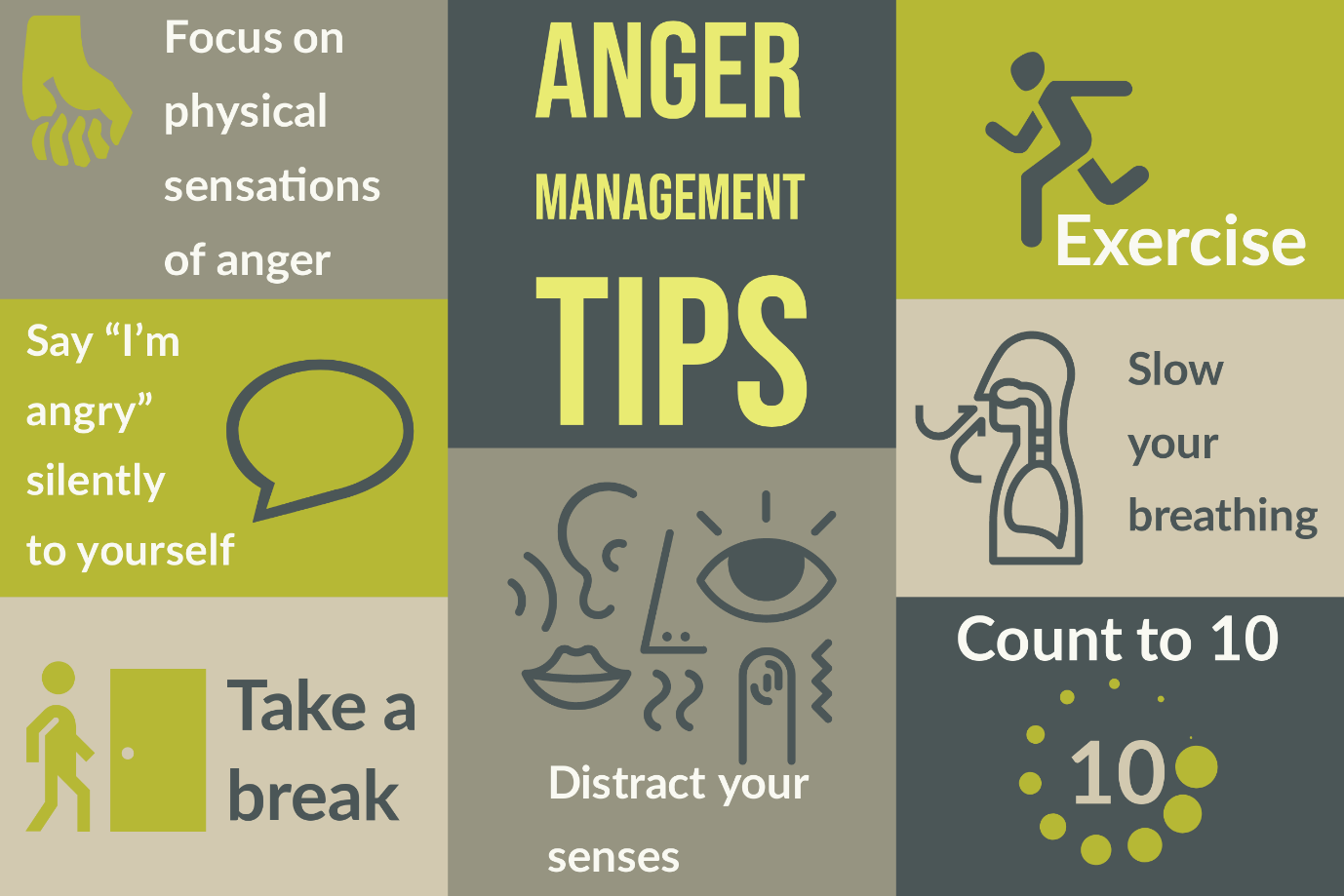Anger Management
Getting angry is a natural reaction to certain life experiences. It’s a basic emotion, arising at times when we come under attack, feel deceived, insulted or frustrated.
Anger helps to relieve built-up energy and tension. While expressing anger can be a healthy way of managing the emotion, when excessive, it can become a problem. Excessive anger may even be a symptom of more complex issues, it can be a symptom of, and contribute to, certain mental health problems and sometimes make present problems worse.
When out of control, anger can become harmful. It can considerably impact the quality of life, affecting relationships, careers and overall well-being. However, there are ways to control anger more effectively and lessen the impact it’s having on daily life.
Expressing anger

Anger is due to poor management of our emotions. Anger, like all emotions, involves physiological and chemical changes in the body affecting heart rate and adrenaline levels. For some people, these surges can become addictive and destructive. There is a fine line between acknowledging anger, and venting until it’s out of control.
Aggression is a natural way to express anger relating back to the ‘fight or flight’ reaction, which allows us to protect ourselves when in danger. But this isn’t always appropriate. There are other ways to express and manage your anger, without aggression, including relaxation techniques and anger management therapy.
When we express anger, we use a variety of conscious and unconscious processes to deal with the feelings. The way in which we control these, however, is what determines whether our anger is healthy or unhealthy. When expressing anger assertively, in a non-aggressive but constructive way, you can assert your needs without hurting the people around you.
There are many ways you can express your anger in an unhealthy way, and many of these have negative repercussions. Often we suppress, convert and redirect our anger – but this can negatively affect health and well-being. If you find it difficult to manage your anger, you may put others down and find yourself being overly critical. You may feel irritable, grumpy and hostile.
When does anger become a problem?
Anger becomes a problem when it starts negatively affecting you and those around you. While this will depend on how you’re expressing your anger, if you’re keeping it to yourself or expelling it at inappropriate times, you are at risk of damaging not only to your health and well-being but also your relationships as well as other aspects of your daily life.
In the long term, this can have devastating consequences. If you keep your feelings to yourself, without learning how to manage them, your aggression may escalate to other types of behaviour, such as physical abuse. You may also find that, over time, you will feel angry more often or more quickly even at the smallest thing.
Most of us will go through a time where we need to ask for help. While we usually get this from friends and family, sometimes we need to talk to a counsellor. A counsellor will offer you the chance to talk about your feelings, and acknowledge your triggers. They can support you on the journey, teaching you more about your anger and how to manage it effectively.
Spotting the signs
If your anger becomes violent or abusive, then much of your life can be affected. This destructive behaviour can affect your career and relationships, and be very damaging for those around you. Talking to a counsellor can help you learn how to cope with your anger, and also how to rebuild any damaged relationships.
It is essential to recognise the signs, as being aware of your feelings can help you manage your anger in future situations. When you sense aggression, you may feel a rush of adrenaline through your body this is why you may react quickly, without control. With adrenaline, you may notice your breath quicken, your heart beating faster and your body becoming tense. Understanding these signs gives you the opportunity to stop and think about how you want to react to a situation.
Signs of an anger problem may include:
- Explosive outbursts and breaking things.
- Getting involved in physical violence.
- Arguing with people around you.
- Losing your temper quickly (for example, road rage).
- A constant desire to lash out physically or verbally.
What makes us feel angry?

We all cope with anger in our own way, just as we do when feeling sad or stressed. There are many reasons why you may not be able to control anger. The way you interpret and react to certain situations can depend on many life factors, including past experiences, your childhood and current circumstance.
You will have your own, personal triggers for what makes you angry. However, there are some situations that will commonly make us all feel angry, such as feeling threatened or attacked, feeling frustrated, powerless or being treated unfairly.
Managing anger

It can be scary when you feel like you can’t control your anger, but there are ways to manage the emotion. Coping methods include taking time to think, such as counting to 10 before reacting, going for a walk or talking to a friend.
Taking a moment to calm down is an often easy way to let go of angry feelings, breathing deeply and slowly or distracting yourself with something you enjoy, like dancing to upbeat music. Though, this isn’t always easy to do. When anger becomes a problem, not everyone can step out of the situation and calm down.
When we start to investigate in greater detail why someone is really angry, we begin to see why this person is truly sad. The same thing that has made you sad, provoked your anger. The more we think about this, the easier it is to see that anger is nothing more than another way of expressing the sadness on the inside.
George Blacken
Anger management therapy aims to reduce the feelings anger creates by allowing individuals to explore possible causes, triggers and confront any underlying issues. Anger management therapy works to address specific types of anger issues, for example, relationships, work-related or adolescent anger, using methods such as mindfulness.
The main aims of anger management therapy include:
- Identifying why you get angry.
- Changing the way you respond to anger.
- Learning skills to handle anger effectively.
- Teaching you how to use anger to motivate or solve problems.
- Teaching you how to communicate effectively.
Anger management therapy typically lasts between four and six weeks, though course duration will depend on your individual circumstance. During sessions, you’ll work with the counsellor to learn specific skills and thought processes, tailored to your needs. Anger management therapy tends to include at-home tasks such as journal writing, and various exercises that help you develop the techniques learnt in the session.
By recognising and accepting anger problems, you can start to understand how to use the emotion in a safe and healthy way. During anger management therapy, you’ll learn how to recognize your frustrations early on, so they can be solved in a way that allows you to express your needs, while staying calm and in control. Basically, anger management can help you reach your goals, solve problems and rebuild any damage that may have occurred as a result of your anger.
Anger doesn’t need to take over your life, remember that there are methods you can learn to manage your anger, and live your life to the fullest.